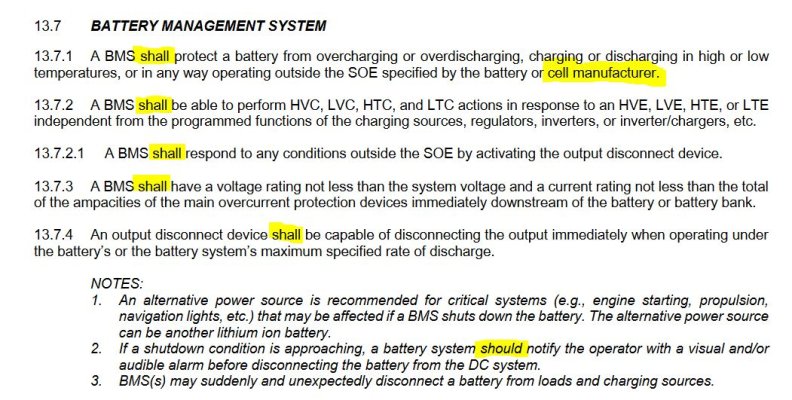Quickly...1=YES and 2=NO.
It's important to remember that E-13 is worded specifically to define a "battery" as one or more cells connected together, and defines "cell" as a single electro-chemical device producing a voltage defined by that chemistry. Also, make note of the use of "shall" vs. "should".
Also, ABYC does not dictate what is 'allowed' in DIY context. ABYC authority comes from the Code of Federal Regulations (Coast Guard) and is applicable to vessels and jurisdictions defined in law. That said, there is no bad advice in any ABYC standard I've seen, but I've seen lots of bad interpretations.
The E-13 specification refers to "Lithium-ion" chemistries specifically and has not yet addressed the newest and safest type of batteries, the Lithium-Ferro-Phosphate (LFP or LiFePo4) batteries. NASA and other researchers have found it is virtually impossible to provoke "thermal runaway" in these batteries (with or without a BMS) and I consider these batteries to belong to a separate class altogether. I can't imagine installing any other type of batteries in any boat now that LiFePo4 is available. Given the severe environmental constraints required for safe installation and operation of other Li-ion chemistries, I think they should all be banned on boats. At the very least, ABYC should point out the differences in various chemistries.
I have not seen any BMS managed battery or BMS standalone system that carries a UL certification -- I'm not even sure UL has addressed this with a standard.
As far as a "user manual", the manual that comes with the BMS system you choose should be included.
I absolutely LOVE the Daly brand Bluetooth-enabled BMS systems for LiFePO4 (technology by Hyundai I think) either in DIY or pre-embedded in sealed LiFePO4 batteries.

